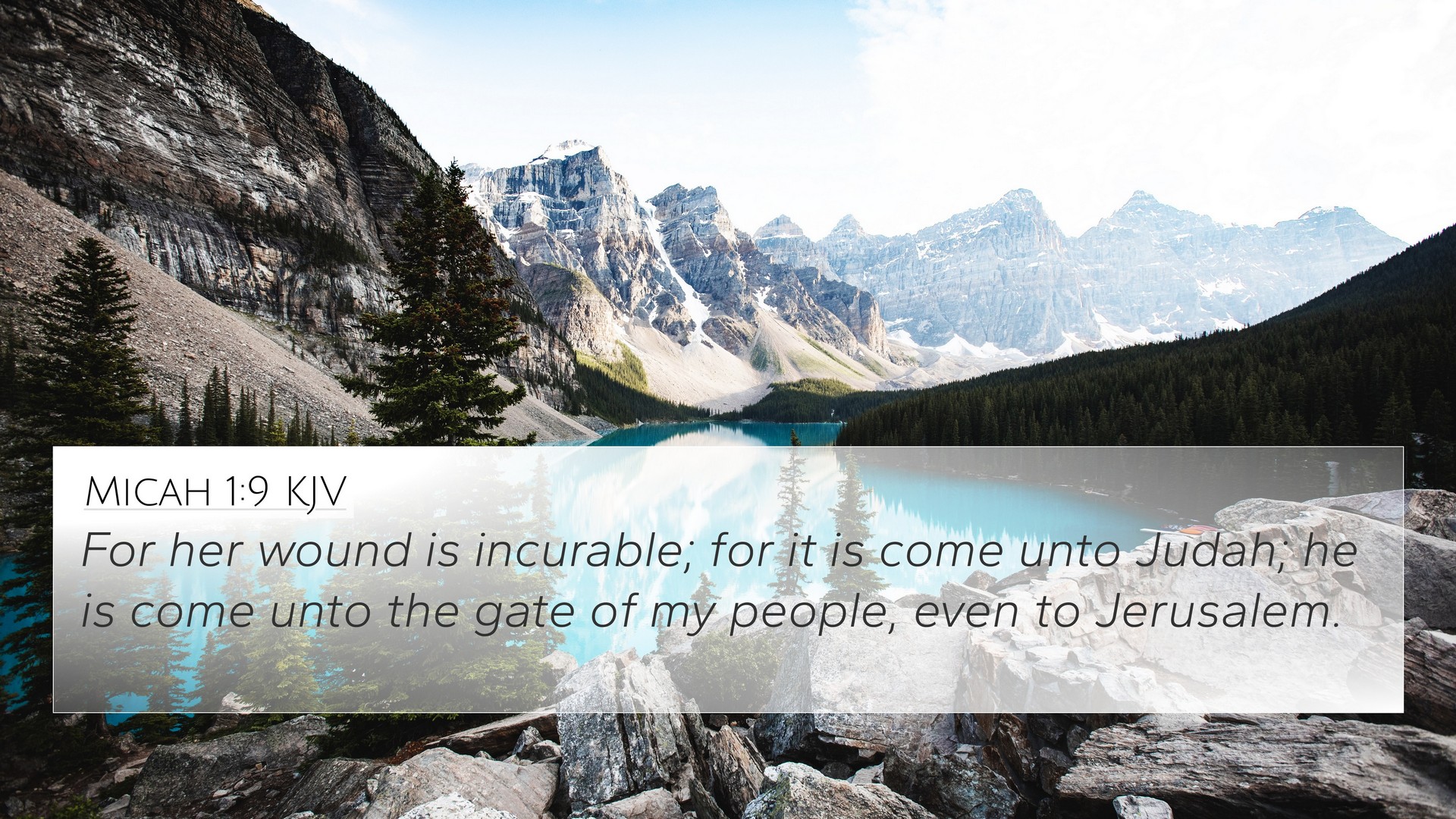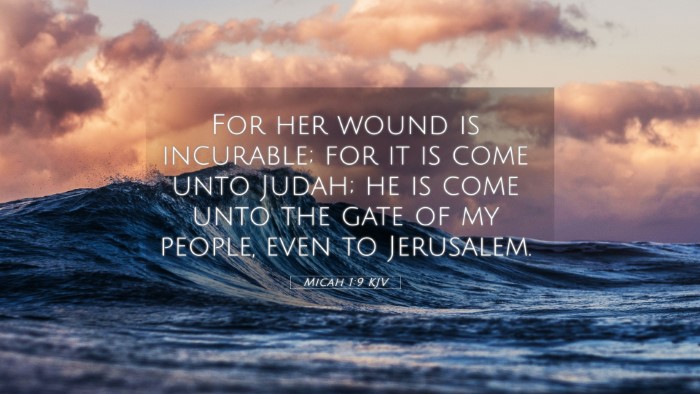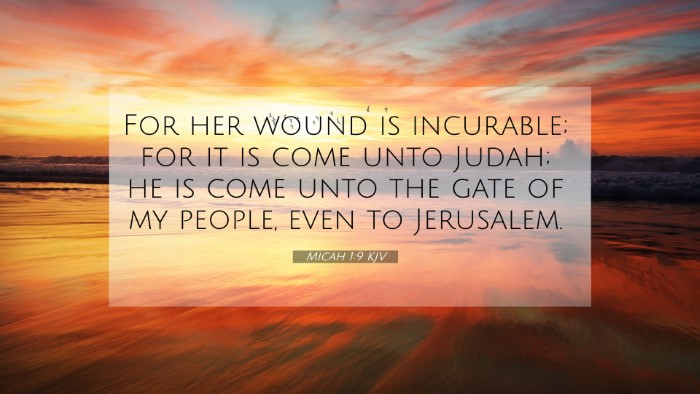Old Testament
Genesis Exodus Leviticus Numbers Deuteronomy Joshua Judges Ruth 1 Samuel 2 Samuel 1 Kings 2 Kings 1 Chronicles 2 Chronicles Ezra Nehemiah Esther Job Psalms Proverbs Ecclesiastes Song of Solomon Isaiah Jeremiah Lamentations Ezekiel Daniel Hosea Joel Amos Obadiah Jonah Micah Nahum Habakkuk Zephaniah Haggai Zechariah MalachiMicah 1:9 Similar Verses
Micah 1:9 Cross References
For her wound is incurable; for it is come unto Judah; he is come unto the gate of my people, even to Jerusalem.
Uncover the Rich Themes and Topics of This Bible Verse
Listed below are the Bible themes associated with Micah 1:9. We invite you to explore each theme to gain deeper insights into the Scriptures.
Micah 1:9 Cross Reference Verses
This section features a detailed cross-reference designed to enrich your understanding of the Scriptures. Below, you will find carefully selected verses that echo the themes and teachings related to Micah 1:9 KJV. Click on any image to explore detailed analyses of related Bible verses and uncover deeper theological insights.
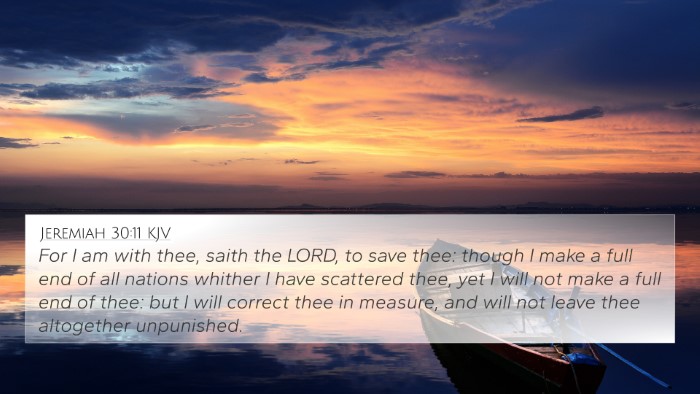
Jeremiah 30:11 (KJV) »
For I am with thee, saith the LORD, to save thee: though I make a full end of all nations whither I have scattered thee, yet I will not make a full end of thee: but I will correct thee in measure, and will not leave thee altogether unpunished.
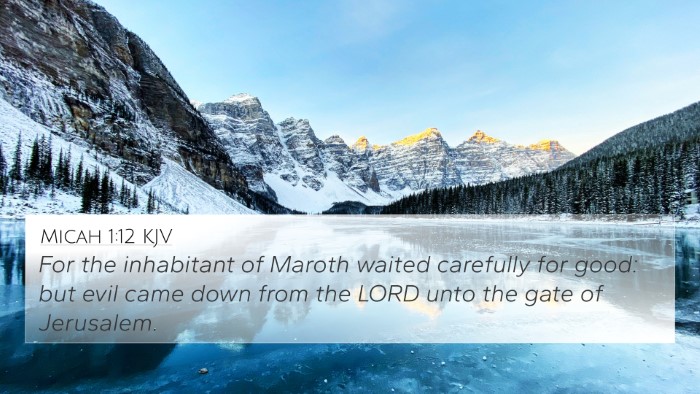
Micah 1:12 (KJV) »
For the inhabitant of Maroth waited carefully for good: but evil came down from the LORD unto the gate of Jerusalem.
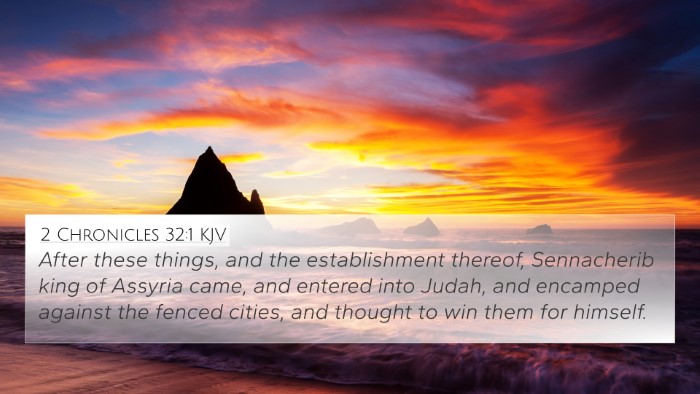
2 Chronicles 32:1 (KJV) »
After these things, and the establishment thereof, Sennacherib king of Assyria came, and entered into Judah, and encamped against the fenced cities, and thought to win them for himself.
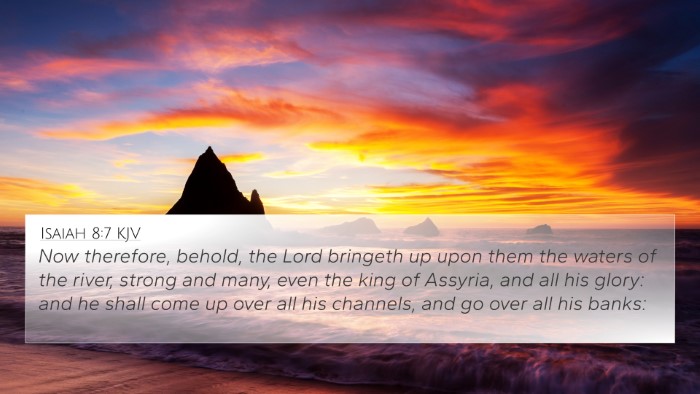
Isaiah 8:7 (KJV) »
Now therefore, behold, the Lord bringeth up upon them the waters of the river, strong and many, even the king of Assyria, and all his glory: and he shall come up over all his channels, and go over all his banks:
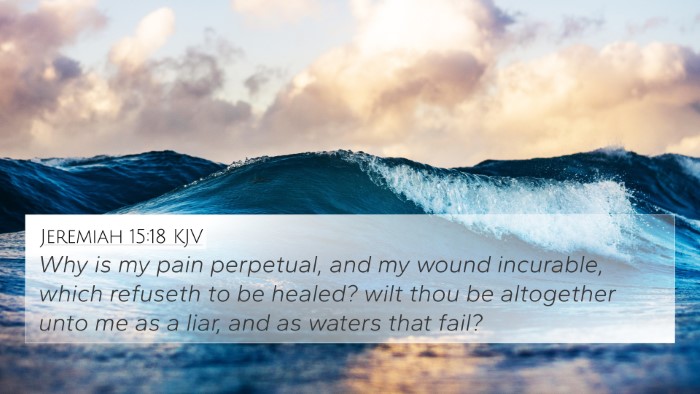
Jeremiah 15:18 (KJV) »
Why is my pain perpetual, and my wound incurable, which refuseth to be healed? wilt thou be altogether unto me as a liar, and as waters that fail?
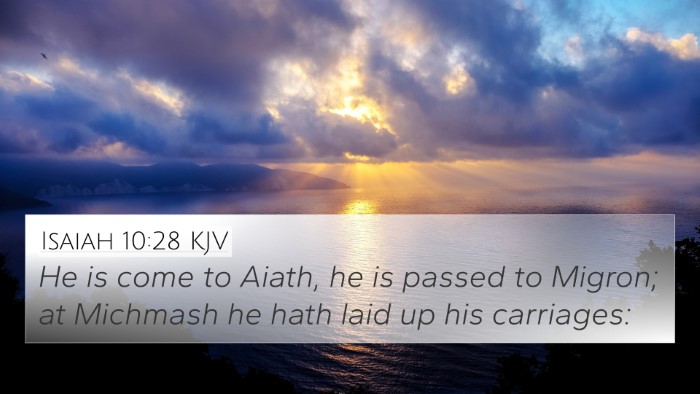
Isaiah 10:28 (KJV) »
He is come to Aiath, he is passed to Migron; at Michmash he hath laid up his carriages:
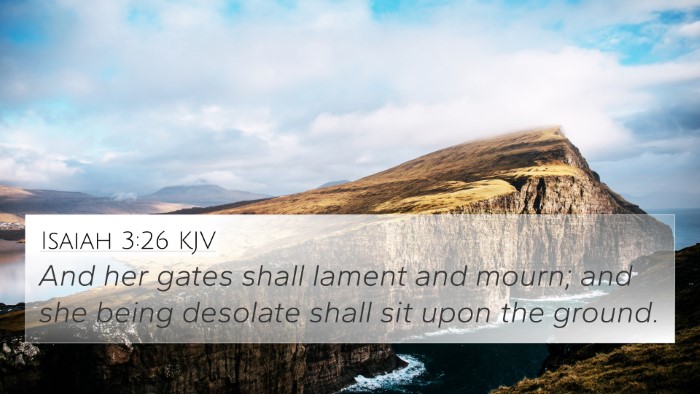
Isaiah 3:26 (KJV) »
And her gates shall lament and mourn; and she being desolate shall sit upon the ground.
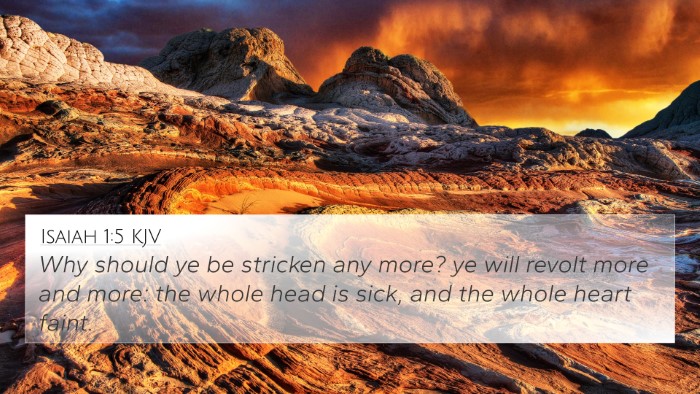
Isaiah 1:5 (KJV) »
Why should ye be stricken any more? ye will revolt more and more: the whole head is sick, and the whole heart faint.
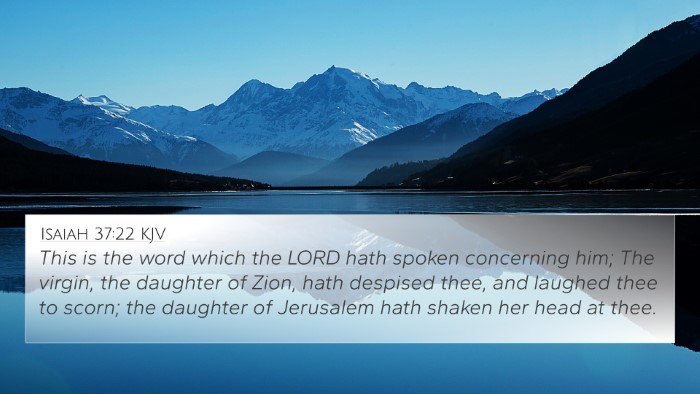
Isaiah 37:22 (KJV) »
This is the word which the LORD hath spoken concerning him; The virgin, the daughter of Zion, hath despised thee, and laughed thee to scorn; the daughter of Jerusalem hath shaken her head at thee.
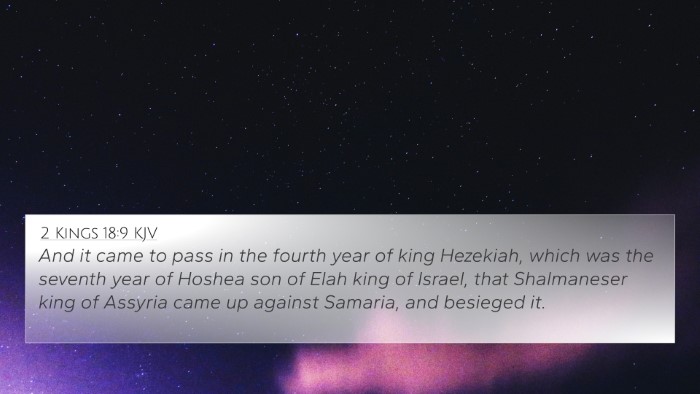
2 Kings 18:9 (KJV) »
And it came to pass in the fourth year of king Hezekiah, which was the seventh year of Hoshea son of Elah king of Israel, that Shalmaneser king of Assyria came up against Samaria, and besieged it.
Micah 1:9 Verse Analysis and Similar Verses
Understanding Micah 1:9
Micah 1:9 states: "For her wounds are incurable, for it has come to Judah; it has come to the gate of My people, to Jerusalem." This verse highlights the severity of the judgment pronounced against the nation of Israel, specifically focusing on Jerusalem and Judah. The insights from public domain commentaries shed light on the deeper meanings and implications of this scripture.
Verse Analysis
The verse serves as a strong statement of impending doom and judgment. It signifies how the calamities of Israel have spread to Judah and specifically to Jerusalem, indicating that no part of God's people is exempt from the consequences of sin. Here are some insights gathered from Matthew Henry, Albert Barnes, and Adam Clarke:
-
Matthew Henry:
Henry emphasizes the sorrow and devastation of the people and how their sins have led to incurable wounds. He reflects on how this serves as a reminder of the severe repercussions of collective wrongdoing, noting that divine judgment is both just and severe.
-
Albert Barnes:
Barnes highlights the significance of "gate of My people" as it represents the centrality of Jerusalem to Israel's identity. He also discusses the inviolable nature of the message from God, which leaves no doubt of the impending risk to the very heart of Israel's faith and governance.
-
Adam Clarke:
Clarke interprets the 'wounds' metaphorically, indicating that they are not physical but spiritual and moral. He raises the idea that despite the apparent hopelessness, God’s call for repentance continues to resonate within the judgments He pronounces.
Connections to Other Bible Verses
Thematic connections can be observed between Micah 1:9 and several other Bible verses, showcasing the interconnectedness of scripture. Below are notable cross-references:
- Isaiah 1:6 - "From the sole of the foot even to the head, there is no soundness in it, but wounds, and bruises, and putrifying sores." This verse reflects the depth of the wounds mentioned in Micah.
- Jeremiah 8:22 - "Is there no balm in Gilead? Is there no physician there?" This verse reinforces the idea of incurable wounds and the need for healing.
- Lamentations 3:9 - "He has blocked my ways with hewn stone; He has made my paths crooked." This resonates with feelings of despair akin to the situation described in Micah.
- Ezekiel 18:30 - "Therefore I will judge you, O house of Israel, every one according to his ways, says the Lord GOD. Repent, and turn from all your offenses, so sin will not be your downfall." A call to repentance in the face of judgment.
- Amos 5:24 - "But let justice roll down like waters, and righteousness like an ever-flowing stream." A thematic connection emphasizing justice and righteousness as central to God's message.
- Matthew 23:37-38 - "O Jerusalem, Jerusalem, the city that kills the prophets and stones those who are sent to it! How often would I have gathered your children together as a hen gathers her brood under her wings, and you would not!" A direct correlation to the significance of Jerusalem in the context of God's people.
- Revelation 21:4 - "He will wipe every tear from their eyes, and there will be no more death or mourning or crying or pain, for the old order of things has passed away." An assurance that redemption comes despite current sufferings.
Thematic Bible Verse Connections
This verse also finds parallels in various themes such as judgment, repentance, and restoration throughout the Bible. The interconnectedness of these themes can be explored through:
- Judgment: God's justice is a continuous theme in both the Old and New Testaments.
- Repentance: Calls for turning back to God amidst hopelessness resonate throughout scripture.
- Restoration: The promise of restoration, despite the looming judgment, showcases God's mercy.
Applying Micah 1:9
For those seeking a deeper understanding through cross-referencing Biblical texts, utilizing tools like a Bible concordance or a Bible cross-reference guide can enhance study. Here's how to effectively engage with this scripture:
- Utilize scriptural cross-referencing to identify connections between Micah and other prophetic texts.
- Explore thematic Bible verse connections to see how themes of judgment and mercy play out in various contexts.
- Engage in comparative Bible verse analysis by examining parallels between prophetic messages and their fulfillments in the New Testament.
- Employ Bible cross-reference study methods to gain insights into how this verse relates to the overall narrative of redemption.
Conclusion
In Micah 1:9, we encounter a vivid depiction of the consequences of sin and a potent reminder of God’s judgment amidst His people. By exploring the connections of this verse to others within scripture, one can appreciate the richness and depth of the Bible's overall message. Understanding these relationships not only enhances biblical literacy but also deepens personal faith and comprehension of God’s enduring truth.
